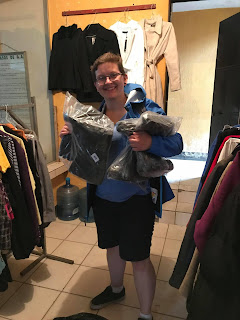In search of the real Kaqchikel

In contrast to most students who attended Guatemala Field Station this year, my background is in nutrition rather than linguistics. I am a registered dietitian/nutritionist. I arrived in Tecpán, Guatemala three months ago to begin a year-long fellowship with the Maya Health Alliance/Wuqu Kawoq , a non-government organization that provides mostly home-based health care in Mayan languages. The fellowship is sponspored by the Academy of Nutrition and Dietetics Foundation . To me, learning to speak local languages is important in order to break through cultural barriers, build trust with patients/clients and to see the world in new ways. You can read more about my interest in languages on my blog www.indigenouslinguist.com . Pictured Above: Guatemala Field Station Teachers Lajuj Batz (Left) and Ixkamel (Center) This year, I set a target for myself to speak the Mayan language of Kaqchikel at 80% fluency by the end of my fellowship. There is only one small problem with this goa...


